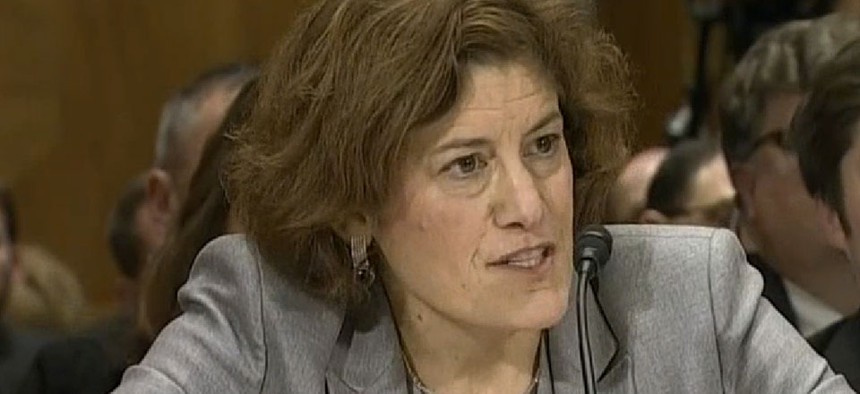
OMB Deputy Director for Management Beth Cobert C-SPAN
Obama Budget Offers a Refreshed Management Agenda
Proposals echo-first term initiatives; list of priority goals to come next week.
The Obama administration’s long-awaited refreshment of its govermentwide management agenda emerged in the fiscal 2015 budget released on Tuesday, with the legally required presentation of agency priority goals to come next week.
As part of a bid to “create a 21st century government,” the new budget documents repeat previous calls for Congress to give the administration authority to reorganize agencies, create a new independent federal property disposal board, continue a crackdown on improper payments and reform Defense Department procurement.. Also included is a vow to enhance the government’s ability to recruit a top-talent workforce.
Beth Cobert, deputy director for management at the Office of Management and Budget, told reporters in a Tuesday conference call that the administration’s “living” agenda—which she said “is not restricted to what we’re outlining today”—is built on four themes: effectiveness, efficiency, economic drivers and people and culture. “We started the agenda by listening to federal workers, Congress, businesses and unions, who gave tremendous input and enormously thoughtful suggestions.”
Items on the management agenda, Cobert said, include reducing red tape to accelerate the construction permit approval process, opening more government data to the public, and streamlining and sharing core agency functions such as human resources, information technology and financial transactions. The Housing and Urban Development Department is in the process of moving all its financial management over to the Treasury Department, she noted -- the largest shared services initiative yet.
The administration’s ongoing efforts to reduce improper payments of federal funds by agencies such as the Internal Revenue Service and the Centers for Medicare and Medicaid Services have succeeded in cutting such payments by 3.5 percent, Cobert said.
In the area of people and culture, the administration seeks “to make sure federal employees have the right tools and are supported by a culture that values innovation and encourages recognition,” Cobert said. Acknowledging the frustrations of the pay freeze, sequestration and government shutdown during the past three years, she said the workforce “has continued to persevere and serve the American people with passion, professionalism and skill,” whether it be in protecting the homeland, providing veterans benefits, helping hurricane victims or searching for cures to deadly diseases.
Cobert also sketched out coming new pilot programs that will allow agencies across government to learn from each other’s programs aimed at improving leadership, recruitment and hiring to narrow skills gaps.
The budget documents released Tuesday ask Congress to revive an authority presidents used from 1932 to 1984 to submit proposals to reorganize the federal government using a fast-track voting procedure. That, OMB said, would allow the executive branch to streamline operations to better serve citizens.
Another Obama proposal would create a Federal Real Property Council to improve the quality of data and performance metrics related to the government’s real estate inventory. (A Republican version of such a plan already has passed the House.) And the 2015 budget proposes continued investment in the Pentagon’s Better Buying Initiative to overhaul the military weapons acquisition system.
The budget also proposed a reorganization of the government’s more than 200 science, technology, engineering and mathematics education programs designed to enable more strategic investment and “more critical evaluation of outcomes.”
“That’s new and very interesting news, “said Jitinder Kohli, a director in Deloitte’s public sector practice who headed the Doing What Works project for the liberal-learning Center for American Progress. Noting that fragmentation in STEM programs has long been criticized by the Government Accountability Office, he told Government Executive that “the devil is in the details, so we’ll have to see what Congress does with this politically charged issue. It’s good to see the challenge recognized.”
Not recognized in the Tuesday budget, Kohli, noted, was the long-anticipated list of new priority goals, as required by the 2010 Government Performance and Results Modernization Act. “I know next week is the intended release, but it’s surprising the goals are not there this week.”
Correction/Clarification: The original version of this story said that HUD had moved all of its financial management functions to the Treasury Department. HUD is still developing a plan to do this. Also, the article has been updated to clarify the circumstances surrounding the release of agency priority goals next week.
NEXT STORY: Is Your Agency Set Up to Drive Performance?







